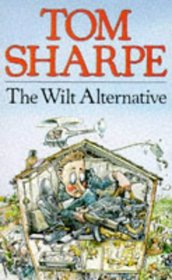Helpful Score: 1
Tom Sharpe (born March 30, 1928) is an English satirical author, born in London and educated at Lancing College and at Pembroke College, Cambridge. After National Service he moved to South Africa in 1951, doing social work and teaching in Natal, until deported in 1961.
His work in South Africa inspired the novels Riotous Assembly and Indecent Exposure. From 1963 until 1972 he was a History lecturer at the Cambridge College of Arts and Technology, which inspired his "Wilt" series Wilt, The Wilt Alternative, Wilt on High and Wilt in Nowhere.
His novels feature bitter and outrageous satire of the apartheid regime (Riotous Assembly and its sequel Indecent Exposure), dumbed-down education (the Wilt trilogy), English class snobbery (Ancestral Vices, Porterhouse Blue), the literary world (The Great Pursuit), political extremists of all stripes, political correctness, bureaucracy and stupidity in general. Characters may indulge in bizarre sexual practices, and coarser characters use very graphic and/or profane language in dialogue. In more printable passages, Sharpe often parodies the language and style of specific authors commonly associated with the social group held up for ridicule. Readers tend to find Sharpe's work either extremely offensive or outrageously funny.
His work in South Africa inspired the novels Riotous Assembly and Indecent Exposure. From 1963 until 1972 he was a History lecturer at the Cambridge College of Arts and Technology, which inspired his "Wilt" series Wilt, The Wilt Alternative, Wilt on High and Wilt in Nowhere.
His novels feature bitter and outrageous satire of the apartheid regime (Riotous Assembly and its sequel Indecent Exposure), dumbed-down education (the Wilt trilogy), English class snobbery (Ancestral Vices, Porterhouse Blue), the literary world (The Great Pursuit), political extremists of all stripes, political correctness, bureaucracy and stupidity in general. Characters may indulge in bizarre sexual practices, and coarser characters use very graphic and/or profane language in dialogue. In more printable passages, Sharpe often parodies the language and style of specific authors commonly associated with the social group held up for ridicule. Readers tend to find Sharpe's work either extremely offensive or outrageously funny.





